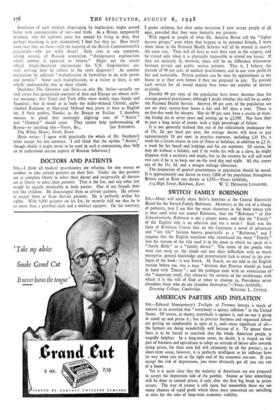DOCTORS AND PATIENTS
Snt,—I think all medical practitioners are refusing, for one reason or another, to take certain patients on their lists. Under the Act patients are at complete liberty to select their doctor and reciprocally all doctors are at liberty to select their patients. That is the law, and any other law would be equally intolerable to both parties. One of my friends does not like children. He discouraged them as private patients. He refuses to accept them as State Service patients. He is perfectly within his rights. With 5,000 patients on his list, he recently told me that he is no more than a glorified clerk and a medical signpost. On the contrary,
I prefer children, but after some hesitation I now accept people of all, ages, provided that they were formerly my patients.
With regard to people of what Mr. Aneurin Bevan call the " higher income groups," even when they happen to be personal friends, I warn them those in the National Health Scheme will all be treated in exactly the same way. They will all have to wait their turn in the surgery, and be visited only when it is physically impossible to attend my house. If they are seriously ill, however, there will be no difference whatsoever between private and public service patients. This is, I believe, the attitude of 99 per cent, of medical practitioners, and in our view perfectly fair and reasonable. Private patients can be seen by appointment at my house or at their own homes if they are prepared to pay. To provide such service for all would require four times the number of doctors available.
Possibly 99 per cent. of the population have lower incomes than the average general practitioner, although I doubt whether this will be so under the National Health Service. Anyway, 99 per cent. of the population are not on duty twenty-four hours a day and 365 days a year. There is no five-day week for doctors. Nor do 99 per cent. have a course of train- ing,lasting six or seven years and costing up to £2,500. Nor have they to pass a long series of exams. with a high percentage of failure.
It is not generally realised that out of the ridiculously inadequate fee of 15s. 2d. per head per year, the average doctor will have to pay approximately 50 per cent. in practice expenses, including £15 15s. a week for a locum tenens in case of illness or holidays, in addition to £2 2s, a week for his board and lodgings and his car expenses. Of course, he may do without a holiday, and if he works his wife as a slave, he might dispense with a secretary and maids, but in the country he will still need two cars if he is to keep one on the road day and night. All this comes out of the 15s. 2d. and a meagre mileage allowance.
The proportion of general practitioners to population should be noted. It is approximately one doctor to every 2,000 of the population throughout Britain and in Kent one doctor to 1,550.—Yours faithfully,


































 Previous page
Previous page